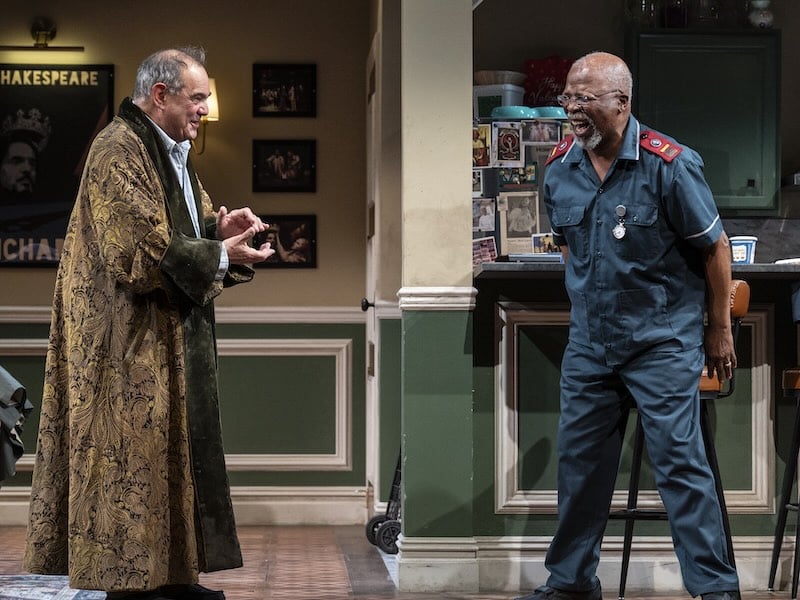John Kani’s Kunene and the King, a U.S. premiere, brings us two great actors in a great play that explores the complex relationship between two South African men on different sides of the racial divide. The play takes place in 2019, 25 years after the first post-apartheid elections, which were won by Nelson Mandela and his party.
Jack Morris, a famous actor with terminal cancer (Edward Gero), lives in a wealthy white suburb of Johannesburg. Lunga Kunene (John Kani), an experienced Black male nurse, is from Soweto township, a historic center of popular resistance to apartheid and the site of one of its most heartbreaking tragedies, which we will learn about in the play.

Dr. Kani has a storied legacy as an actor, playwright, director, and activist. He is best known in America for his 1975 Tony-winning performances in The Island and Sizwe Banzi Is Dead, which he co-wrote with Athol Fugard and Winston Ntshona. But he is also internationally recognized for his work in theater and film. Director Ruben Santiago-Hudson, another Tony Award winner, is well-known as a director, actor, and playwright. With Lackawanna Blues (2005), he became the first person on Broadway to write, direct, and act in a play. He has also appeared in Sizwe Banzi Is Dead
Kunene and the King, which had its world premiere at the Royal Shakespeare Company (2020) and in South Africa, reflects the changes after apartheid, but it is also the story of two men with very different struggles. Jack, an alcoholic, cannot help displaying racist attitudes. Lunga, determined to take care of his patient, is repeatedly forced to demand the respect he has been denied. Jack, who has been cast as King Lear, enlists Lunga to help him learn his lines. Lunga’s actual job is to keep him alive.
Both are experts in their field. And both have a deep love for Shakespeare. Lunga’s exposure to it has been unfairly limited, but he still has strong opinions about the play. About Lear he says this:
LUNGA: It’s not right what he did. I wouldn’t have advised him to do that if I was there. Bad things might happen to him. He might anger the ancestors.
JACK: There are no ancestors. This is not an African story. The English have no ancestors. .
LUNGA: Everybody has ancestors.
JACK: (in pain) What the hell are you talking about?
The power struggle between the two men is piercingly honest, sometimes brutal, sometimes shot through with humor. They perform a stirring bilingual duet of Mark Antony’s speech in Julius Caesar. They engage in a kind of repartee. They execute a debonair dance. But South Africa and its history are never far from the surface. Neither is Jack’s illness.
LUNGA: Funny thing, the people who say they don’t know about politics are usually very political. But on what side?
JACK: Ja, well look, I’m not going to lie. When I was growing up, life was good for us and we wanted to ride it to the end.
(Jack is suddenly in discomfort.)
JACK: Oh, no. This isn’t fair.
(Jack runs to the bathroom.)
LUNGA: (quietly, to himself) Life was good. They wanted to ride it to the end.
Kani and Edward Gero, a longtime member of the STC company and DC favorite, play together like two master musicians. In the intervals, Isithunywa (Ntebo), the Guiding Spirit, sings hauntingly beautiful songs. Her voice adds another dimension to an already gripping production. Ntebo is also a music consultant; additional music is by Romero Wyatt.

The set designed by Laurence E. Moten III serves as a poignant reminder of the differences between the two men. Jack’s home is spacious and well-appointed, featuring a poster of him as Richard II, while Lunga’s is smaller and less elaborately furnished.
Sound Designer DJ Potts’ evocative storm enhances the occasionally foreboding atmosphere. Rui Rita designed the lighting, and costumes are by Karen Perry. Under Ruben Santiago-Hudson’s direction, every aspect of the production reflects artistic integrity and exceptional execution.

In the Xhosa language, indigenous to Southern Africa, Lunga means “Kindness” and Kunene means “Truth.” Kani examines both concepts here. But there is also a flawed friendship, a country in conflict, and a writer whose greatness the two friends can share. So we can say, as John Kani does in his Asides essay, “SHAKESPEARE LIVES.”
Running Time: Approximately one hour and 40 minutes with no intermission.
EXTENDED: Kunene and the King plays through March 23, 2025, at Shakespeare Theatre Company’s Michael R. Klein Theatre (formerly the Lansburgh) – 450 7th Street NW, Washington, DC. Tickets ($39–$160) are available at the box office, online, or by calling (202) 547-1122. STC offers discounts for military servicepeople, first responders, senior citizens, young people, and neighbors, as well as rush tickets. Contact the Box Office or visit Shakespearetheatre.org/tickets-and-events/special-offers/ for more information. Audio-described and ASL-interpreted performances are also available.
The Asides program for Kunene and the King is online here.
COVID Safety: All STC spaces are mask-friendly — meaning all patrons, masks and unmasked, are welcome. Read more about Shakespeare Theatre Company’s Health and Safety policies here.
Kunene and the King
By John Kani
Directed by Ruben Santiago-Hudson
Produced in association with Octopus Theatricals
CAST
Jack Morris: Edward Gero*
Lunga Kunene: John Kani*
Isithunywa: Ntebo
Understudy, Lunga Kunene: L. Peter Callender*
Understudy, Jack Morris: John Lescault*
ARTISTIC TEAM
Playwright: John Kani*
Director: Ruben Santiago-Hudson
Scenic Designer: Lawrence E. Moten III
Costume Designer: Karen Perry
Lighting Designer: Rui Rita
Sound Designer: DJ Potts
Dialect and Vocal Coach: Deborah Hecht
Fight Consultant: Sierra Young
Dramaturg: Drew Lichtenberg
Music Consultant: Ntebo
Additional Music: Romero Wyatt
Casting: Caparelliotis Casting, David Caparelliotis, CSA and Joe Gery, Danica Rodriguez
Associate Director: Timothy Johnson
Production Stage Manager: Laura Smith*
Assistant Stage Manager: JuanCarlos Contreras*
*Member of Actors’ Equity Association, the Union of Professional Actors and Stage Managers



